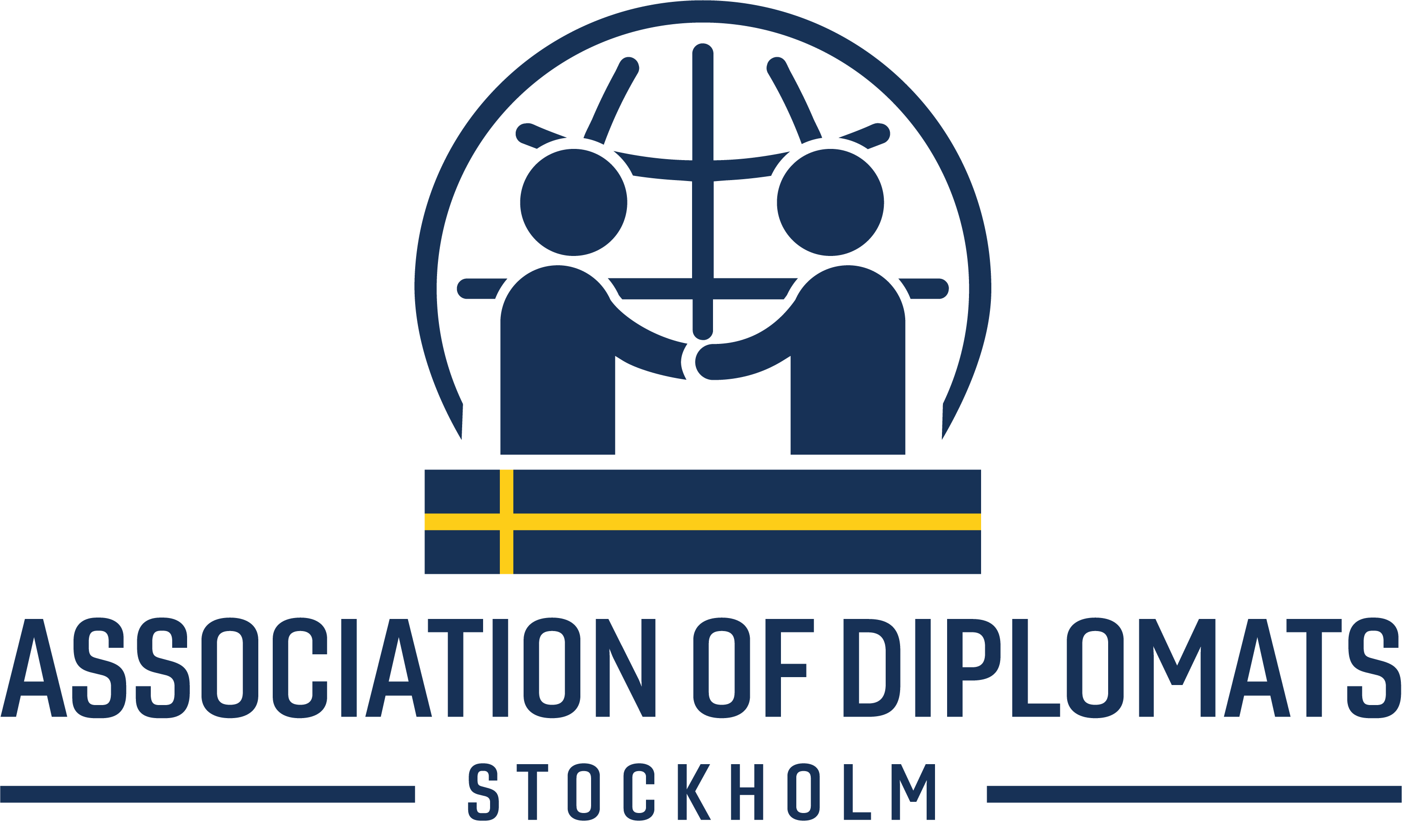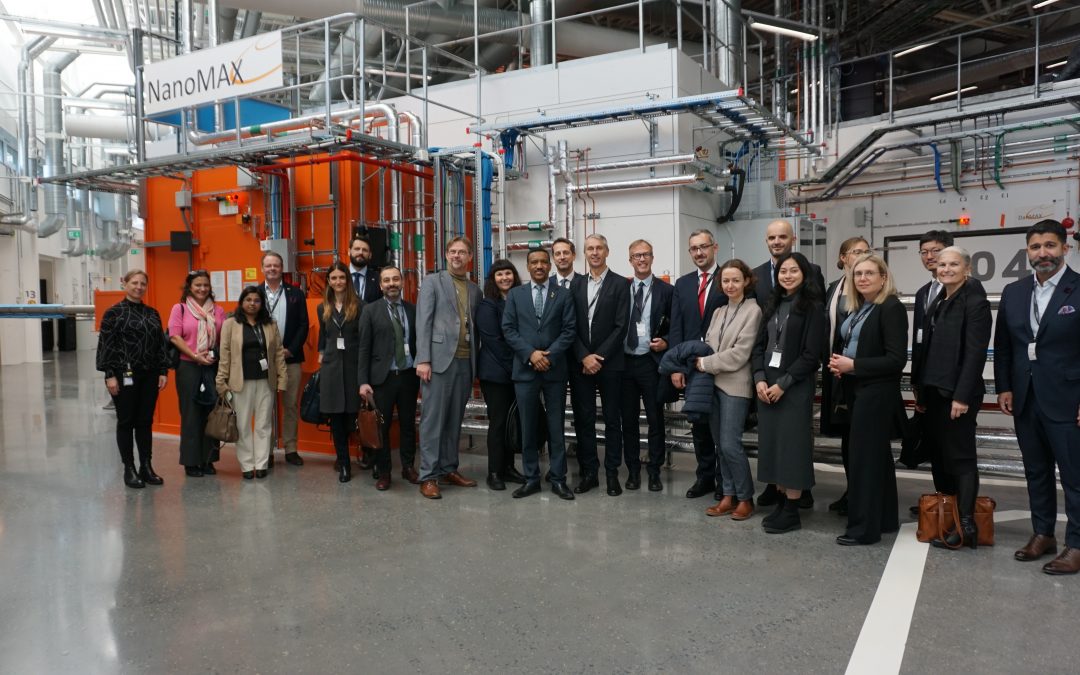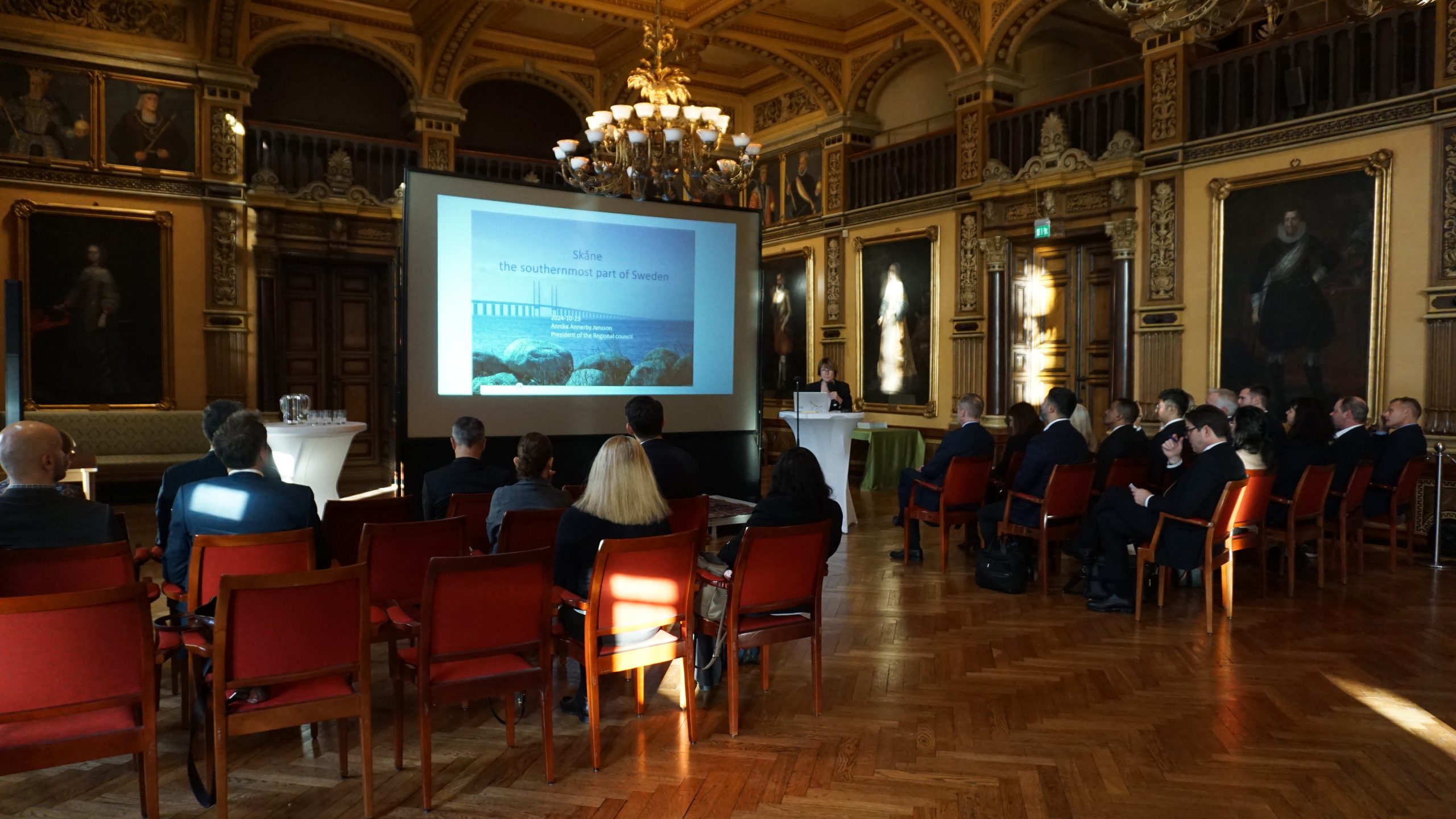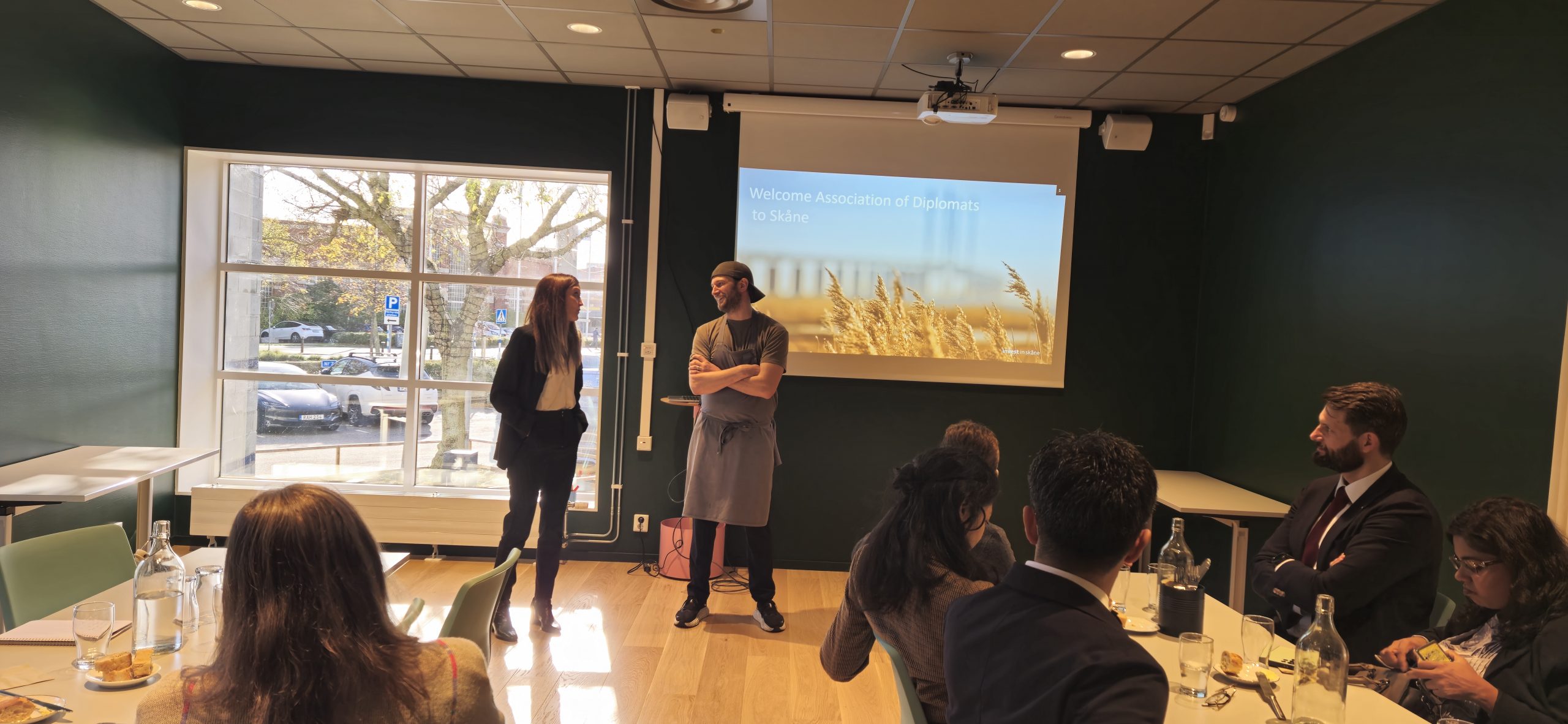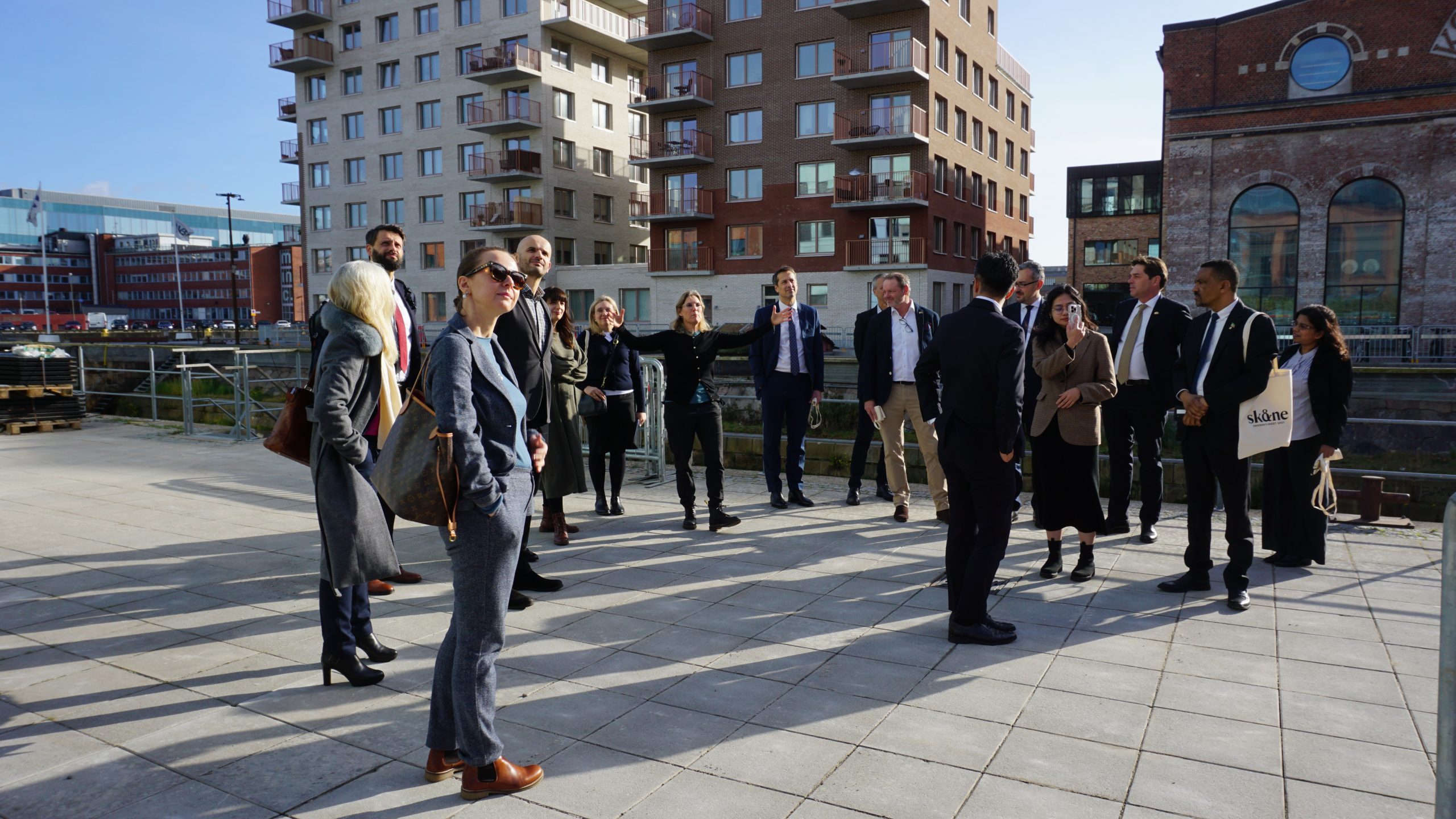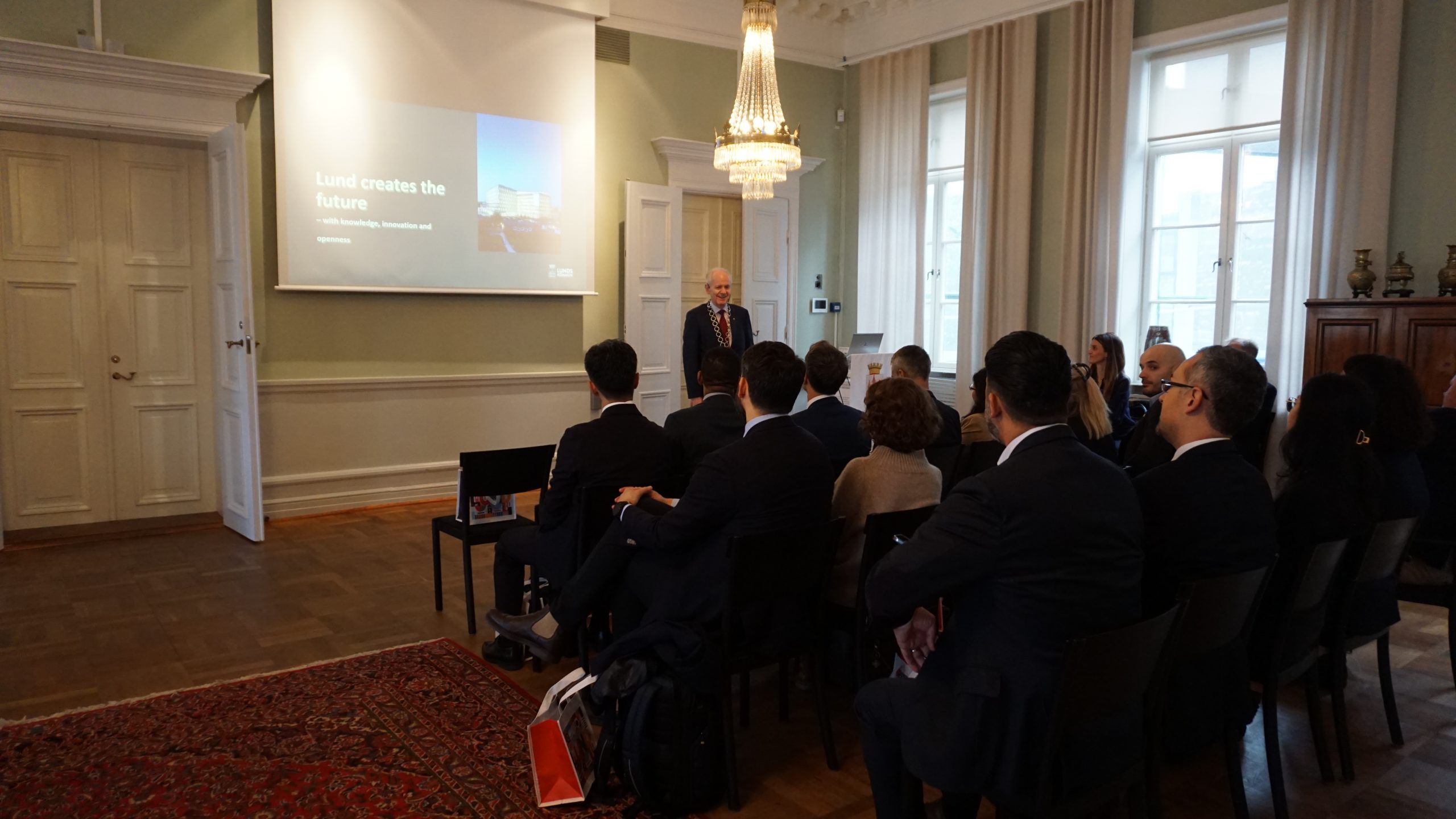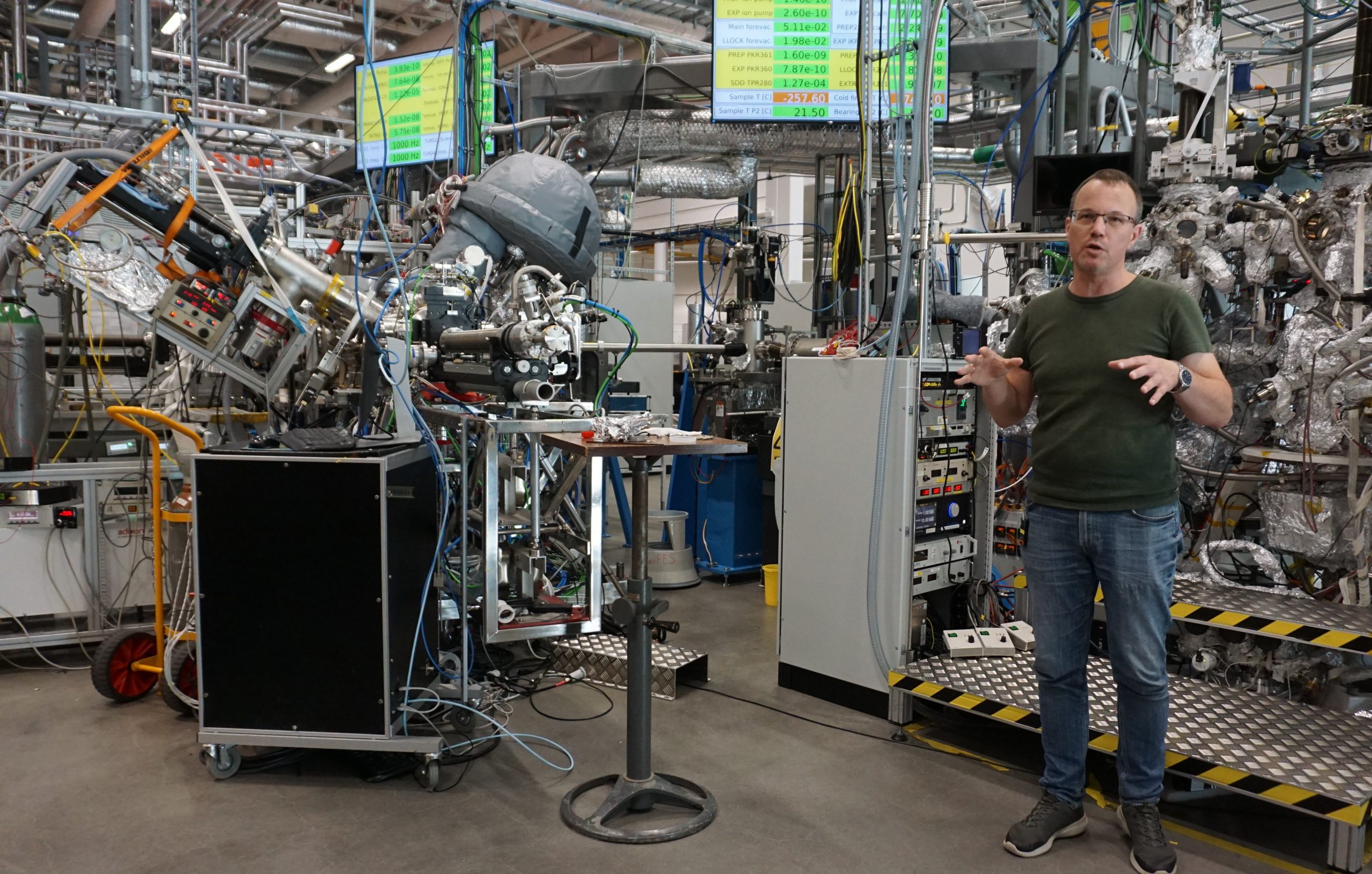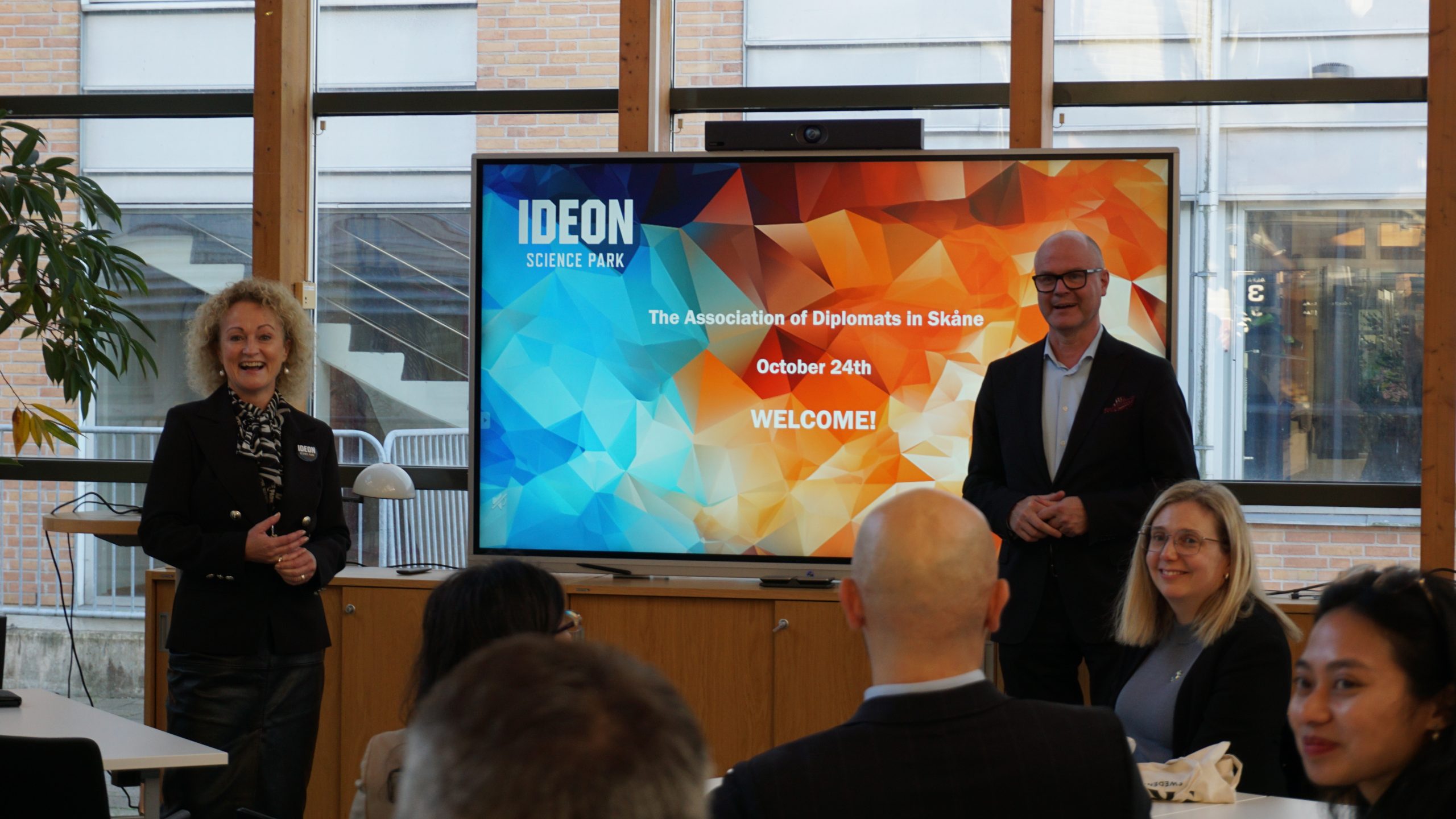Under the theme “From Science, Technology, and Innovation to Business,” the trip offered the delegates a comprehensive view of Skåne’s strategic initiatives and with onsite visits to leading-edge developments in science, technology and innovation.
Warm Welcome in Malmö: Skåne’s Vision for Sustainable Development
The trip kicked off in Malmö, where Ms. Carina Nilsson, President of Malmö’s City Council, Ms. Annika Annerby Jansson, President of the Regional Council, and Mr. Mats Kryhl, Head of the Governor’s Office, extended a warm welcome to the diplomats. Introducing Skåne’s roadmap for sustainable growth, Ms. Nilsson underscored four core priorities: improving health for all, bolstering a competitive business sector, expanding regional connectivity, and addressing workforce needs.
Julieta Casanova, senior adviser from Invest in Skåne/Region Skåne introduced the origin and purpose of the 2 days program, that was focused in economic and tech diplomacy, highlighting the region’s global connectivity, and its economic and innovation profile, inviting also Kristina Halasz Anderberg, Development Manager for Innovation and Entrepreneurship, to elaborate on Skåne Innovation Strategy for sustainable growth.
At the World Maritime University: Shaping Maritime Standards Worldwide
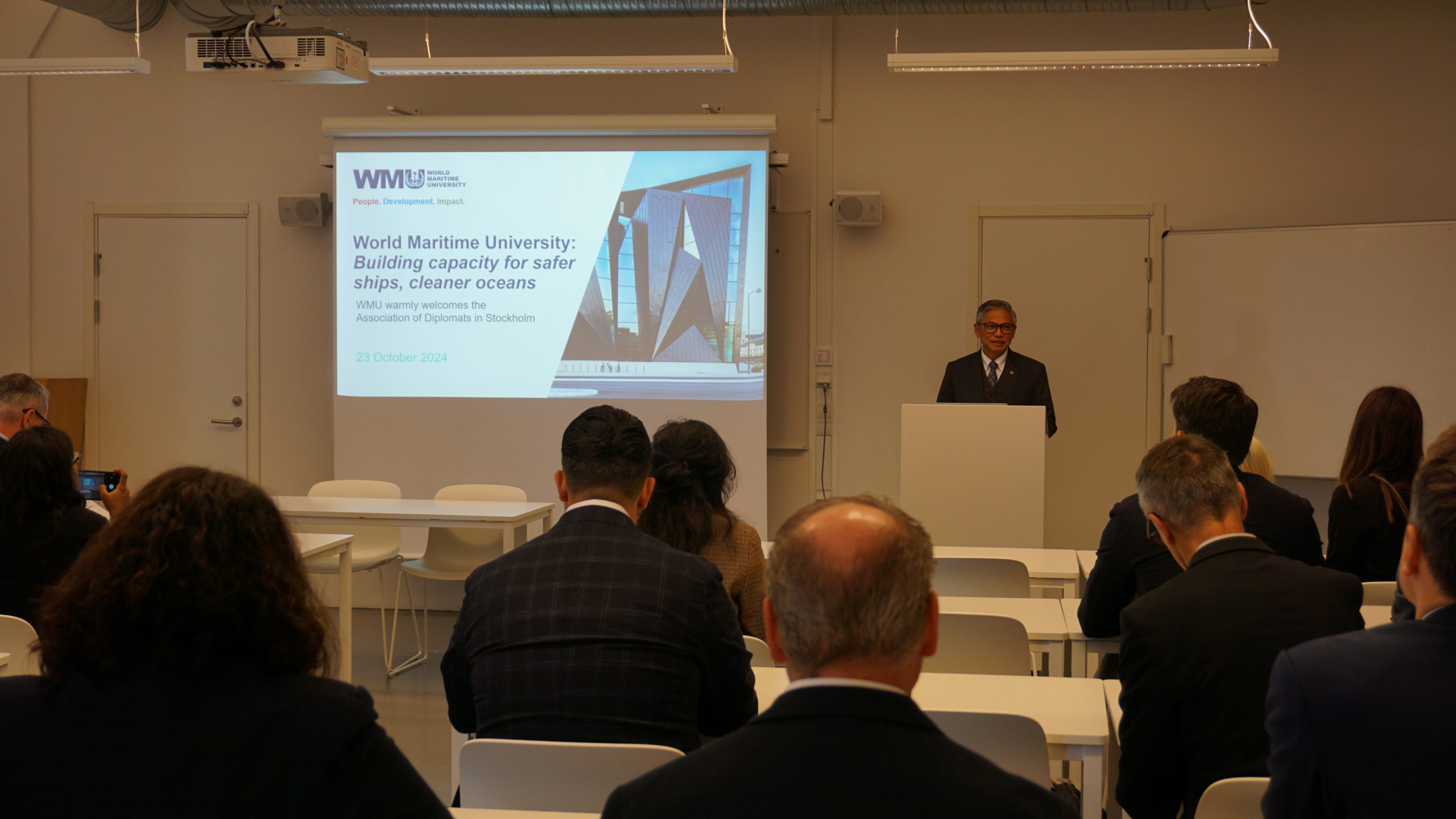
WMU’s research includes the CHECK project, which is focused on the urgent need to decarbonize long-distance shipping—one of the largest contributors to global emissions. Additionally, WMU’s Arctic and ocean governance studies inform international policies, supporting sustainable ocean management in the face of climate change and polar ice melt.
At the World Maritime University: Shaping Maritime Standards Worldwide

WMU’s research includes the CHECK project, which is focused on the urgent need to decarbonize long-distance shipping—one of the largest contributors to global emissions. Additionally, WMU’s Arctic and ocean governance studies inform international policies, supporting sustainable ocean management in the face of climate change and polar ice melt.
Innovations in Circular Economy and AgTech
At a thematic lunch hosted by Region Skåne, Erik Andersson, CEO of SPILL, shared insights into the company’s approach to tackling food waste, which has been embraced by local and international partners. SPILL operates a model where meals are prepared based on demand forecasts, and leftover ingredients are shared with nearby businesses. SPILL’s efforts align with Skåne’s push for circular economy solutions, which are increasingly becoming a focus in local policies.
Olof Tedin from Invest in Skåne and Margareta Wllentén, in representation of Food Innovation Network, expanded on Skåne’s vibrant AgTech and food tech landscape, supported by leading institutions like SLU Alnarp and Kristianstad University. He discussed the Northern Lights on Food initiative, a collaboration with MAX IV and ESS, which is using high-energy x-rays to explore food structures at the molecular level. This groundbreaking work could lead to healthier, more sustainable food products, supporting Skåne’s reputation as a leading region in sustainable food tech and agriculture.
Creative Industries: Malmö’s Startup and Gaming Scene
The creative energy of Malmö was palpable at Media Evolution, where Pernilla Lavesson led a tour of the space dedicated to fostering innovation and collaboration. Daniel Persson, CEO of MINC, and Peter Lubeck, CEO of GAME HABITAT, shared their organizations’ roles in building a strong support network for startups and gaming companies. Through initiatives such as shared knowledge spaces and international outreach, Malmö is positioning itself as a hub for creative industries.
Annita Douka, from Malmö Generate District, discussed principles like creating accessible knowledge and optimizing urban spaces for innovation—further strengthening Malmö’s DNA as a city of innovation.
Malmö’s Media Evolution, a collaborative space for digital industries, offered the delegation a glimpse into Skåne’s growing creative sector. Pernilla Lavesson explained how Media Evolution supports networking, knowledge-sharing, and partnerships among startups, fostering a collaborative culture.
Daniel Persson, CEO of MINC, described how Malmö’s startup incubators have helped hundreds of companies launch successfully, with many now expanding globally.
Peter Lubeck of GAME HABITAT shared that the region’s gaming ecosystem has grown into one of Europe’s leading hubs, attracting companies from King, Massive Entertainment and Sharkmob, all subsidiaries of larger game developers.
Game Habitat has even pioneered initiatives to help international gaming firms test the waters in Malmö, providing a guest office for startups to integrate and innovate.
Annita Douka from Malmö Generate District described the District’s innovative urban development model that integrates local identity and global perspectives. The district’s principles—accessibility, cross-connection, and optimized urban space—are designed to create a dynamic and inclusive environment where new ideas can thrive, in sync with Malmö’s forward-looking city strategy.
Exploring Lund and Helsingborg: Sustainability and Future-Focused Development
The delegation continued to Lund, where Mayor Mats Helmfrid and Lena Eskilsson, Deputy Vice-Chancellor of Lund University, highlighted Lund’s goals as a global, e-learning, and research-intensive university. Lund’s sustainability projects, such as a solar-powered waste vacuum system and renewable district heat production, reflect its future-focused approach.
Zeynep Erdal of Helsingborg Innovation District highlighted Helsingborg’s H22 initiative, a vision for a “smarter” city focusing on sustainable urban living. Unlike a traditional science park, Helsingborg’s innovation district integrates residential, commercial, and green spaces, creating a model for sustainable urbanization. The district also attracts international collaboration, welcoming innovators from across Europe to test ideas and technologies in a real-world setting.
At MAX IV: Pioneering Research Infrastructure
One of the high points of the tour was an in-depth look at MAX IV in Lund. Yngve Cerenius, Deputy Director of MAX IV, explained the lab’s distinction as a fourth-generation synchrotron, making it one of the brightest X-ray sources worldwide. MAX IV serves over 1,700 researchers annually, enabling advancements in material sciences, medicine, and energy solutions.
Researchers from around the globe use MAX IV’s facilities to study everything from new drugs to green energy solutions, adding substantial value to both the academic and industrial sectors.
Nearby, ESS, a groundbreaking neutron source facility, complements MAX IV’s work. Together, these institutions form Science Village Scandinavia, fostering collaborations with global companies, universities, and startups. This setup is a magnet for scientific talent, making Skåne an emerging European leader in high-tech research and innovation.
At MAX IV: Pioneering Research Infrastructure
One of the high points of the tour was an in-depth look at MAX IV in Lund. Yngve Cerenius, Deputy Director of MAX IV, explained the lab’s distinction as a fourth-generation synchrotron, making it one of the brightest X-ray sources worldwide. MAX IV serves over 1,700 researchers annually, enabling advancements in material sciences, medicine, and energy solutions.
Researchers from around the globe use MAX IV’s facilities to study everything from new drugs to green energy solutions, adding substantial value to both the academic and industrial sectors.
Nearby, ESS, a groundbreaking neutron source facility, complements MAX IV’s work. Together, these institutions form Science Village Scandinavia, fostering collaborations with global companies, universities, and startups. This setup is a magnet for scientific talent, making Skåne an emerging European leader in high-tech research and innovation.
A Look Inside IDEON Science Park: Lund’s Thriving Innovation District
Bosch’s R&D center, focusing on life sciences and IoT, illustrates Skåne’s attractiveness to global players. With a talent pool nurtured by Lund University and close ties to companies like Ericsson and Sony, Skåne continues to attract investment in future-oriented technologies, enhancing its reputation as a global innovation leader.
A Look Inside IDEON Science Park: Lund’s Thriving Innovation District
Bosch’s R&D center, focusing on life sciences and IoT, illustrates Skåne’s attractiveness to global players. With a talent pool nurtured by Lund University and close ties to companies like Ericsson and Sony, Skåne continues to attract investment in future-oriented technologies, enhancing its reputation as a global innovation leader.
ADS would like to thank all the partners who collaborated on the preparation of the program of the visit.
